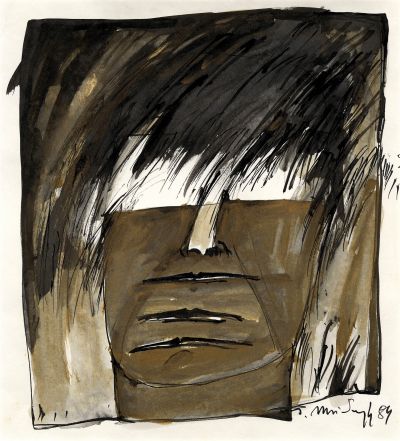Janina Musiałczyk. W drodze, on the road
Mediathek Sorted




































































































At first, in the early 2000s, during her travels between Hamburg and Łódź, during which she took dozens of photographs from the moving train for new artists’ books, Musiałczyk was still impatient: “run to you / run and run / trees flicker past / [...] wheels throb / fields forests / cites towns / run and run” (renne zu dir / renne und renne / bäume flackern vorbei / […] räder pochen / fluren wälder / städte städtchen / renne und renne)”.[76] A decade later, the fear of not only having lost important travel items, but also the memories on one of these journeys, turned out to be no more than a bad dream, linked to the certainty that not everything had been lost, after all. “dream of a lost suitcase / of forgotten treasures / of walking on a muddy path / of searching for far-away places / [...] where once I was / where my baggage remains” (“traum von verlorenem koffer / von vergessenen schätzen / vom wandern auf schlammigem weg / vom suchen entlegener orte / […] wo einst ich schon war / wo mein gepäck harrt”).[77]
From 2000–2007, under the collective title “Episodes” (Episoden), (Fig. 88–92) Musiałczyk produced several series of small-format colour picture stories, in which she portrayed the psychological and spiritual entanglement of individuals, relationships between couples and one time also triangular relationships. On that day, she wrote in 2005, a small picture was produced which fulfilled the desire “to wrest individual scenes from the flow of events and from the uniformity in which they become lost”.[78] Experienced in the analysis of psychological states, she now dedicated herself, with precise observation and in the style of pictorial satire, to the human relationships and activities that are to be found in everyday life. In an over-exaggerated way that is never deadly serious, she reduces figures to a single body part, restricts couples to an outline and extends limbs to act as brackets to make clear that we are all connected to each other, and that only in exceptional cases does any one of us exist for him or herself alone. Piotr eL wrote: “In her work, I find something that frightens, but that also discretely soothes: Janina sees painfully clearly what shames and aggrieves, yet this clarity is mitigated by the heartfelt warmth of her view onto the small private dramas that make up the life of each and every one of us”.[79]
Under the shadow of the migration crisis between Belarus and the European Union in August 2021, during which ten migrants died when refugees from Afghanistan, Iraq, and other countries were forced to remain in the border territory between Belarus and Poland, Musiałczyk began a new series of drawings and paintings under the working title “Flight – Refuge” (Flucht – Zuflucht), which also referenced her own story of flight. With the plan to use the images, which were constantly updated on public and social media, “with the aid of traditional techniques and small formats”, to create “space – and at the same time provide refuge – for a very different testimony; the silent, intimate expression not influenced by discourse”,[80] she produced works on dark, pre-dyed paper with coloured drawing inks, white and black Indian ink, wooden quills, coloured pencils, felt-tip pens and paint pens, and combined them with monotype and the stamping technique she had used earlier. Acrylic images were created on dark, pre-dyed canvases and tinted paper. That same year, in order to then produce an artist’s book using some of these works, which was entitled “I Don’t See It, so It Isn’t There” (Seh nicht, also ist nicht / Nie widzę, więc nie ma), Musiałczyk received a “Hamburg future stipend for the fine arts and literature” awarded by the Hamburg Ministry of Culture and Media (Hamburger Kulturbehörde) in collaboration with the Hamburg Culture Foundation (Hamburgische Kulturstiftung) and the Hamburg professional artists’ association (BBK Hamburg).
The fold-out double pages of the artist’s book, which was published in 2022, show people beating their way through deep forests, pushing on through undergrowth and grassland, standing in front of fences and screaming for help, and finally, emerging from the darkness (Fig. 93–99). However, their situation is not hopeless: finally, at the end of the book, a few of them step into a field of light blue. In summary, Piotr eL wrote: “... what a horribly painful scream. [...] ... the sublimated hypostasis of a drastic observation – in other words, what the purpose of art can also be”.[81]
The title of this, the artist’s most recent book, “I Don't See It, so It Isn’t There” (Nie widzę, więc nie ma / Seh nicht, also ist nicht)[82], in which the viewing slits between the folded-in double pages offer the reader a glimpse onto the drama that is taking place behind them, could also be the motto for Janina Musiałczyk’s work overall: events can only persist in reality when we do not close our eyes to them. Only that which is made visible, if only through art, can exist. That to which we close our eyes is in danger of being forgotten.
Axel Feuß, October 2023
[76] “run to you” (renne zu dir), oktober 2004/2, in: w drodze_unterwegs 2015 (see note 32).
[77] “dream of a lost suitcase" (traum von verlorenem koffer), 17 November 2013, ibid.
[78] Janina Musiałczyk: Episoden, self-published, Hamburg 2005.
[79] Piotr eL on the occasion of the exhibition “Janina Musiałczyk. Searching for the Form, I find the Anecdote” (Szukajac formy znajduję anegdotę), Galeria Nieformalna, Warsaw, 20.8.2015.
[80] From Janina Musiałczyk's final report for the “Hamburg future stipend for the fine arts and literature” (Hamburger Zukunftsstipendium für Bildende Kunst und Literatur), March 2022.
[81] Piotr eL (Częstochowa) in a letter to Janina Musiałczyk, 27 August 2022.
[82] Janina Musiałczyk: Seh nicht, also ist nicht. / Nie widzę, więc nie ma., book design and typography: Iga Bielejec, self-published, Hamburg 2022.





















































































